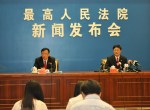 On 27 April 2015, the Supreme People’s Court issued a judicial interpretation (English translation here) (27 articles) of the Administrative Litigation (Procedure) Law) (Administrative Litigation Law JI). Judge Li Guangyu, deputy head of the Administrative Tribunal noted that it is not intended to be comprehensive but to address major practical issues the lower courts will face as the law becomes effective.
On 27 April 2015, the Supreme People’s Court issued a judicial interpretation (English translation here) (27 articles) of the Administrative Litigation (Procedure) Law) (Administrative Litigation Law JI). Judge Li Guangyu, deputy head of the Administrative Tribunal noted that it is not intended to be comprehensive but to address major practical issues the lower courts will face as the law becomes effective.
It was not issued for public comment (there is no such requirement), but comments were solicited within the court system, as well as from the procuratorate, and other authorities, such as the administrative authorities (State Council Legislative Affairs Office and its local counterparts) and the National People’s Congress Legislative Affairs Commission (and its local counterparts).
This judicial interpretation sets out specific rules concerning judicial review of administrative action, filling in some of the blank spots, adding definitions and inserting some specific legal infrastructure (such as filing deadlines) into the Administrative Litigation Law. It is relevant to:
- Chinese individuals, companies (domestic and foreign-invested alike), and organizations seeking to challenge a broad range of government actions and decisionmaking;
- Foreign governments and international organizations reviewing China’s undertakings to provide impartial and independent tribunals to review administrative action (as China did in its accession to the WTO) or negotiating investment protection and other treaties with the Chinese government;
- Foreign companies, organizations, and individuals seeking to challenge Chinese government action.
The judicial interpretation addresses 10 major areas, but this post will highlight the following:
- case filing;
- requirement that a “responsible person” of an administrative agency to appear in court;
- consolidated hearing of a related civil matter;
- consolidated review of normative documents;
- administrative agreements
- consolidated hearing of a related civil matter.
Case filing
Article 1 of the judicial interpretation addresses pervasive refusal by local courts to accept cases (and related problems)(recognized by all stakeholders), by:
- directing courts to accept cases on the spot, if it is apparent that the complaint meet statutory requirements;
- directs courts to respond within 7 days, if further review is required;
- if a court still is unsure after 7 days, it is directed to accept the case.
Appearance by a responsible person
Although during the passage of the Administrative Litigation Law, much was made of the requirement in Article 3 that a “responsible person” appear in court, Article 5 of the Administrative Litigation Law JI clarifies that the head or deputy head of an administrative agency may appoint a representative to appear in court.
Administrative agreements
Article 11 of the Administrative Litigation JI seeks to address, in greater detail, several issues: the definition of an administrative agreement, and what to do about a breach of one. In particular, it details how courts need to hear an aggrieved private party, when a government agency improperly terminates, amends, or fails to perform either:
- land acquisition and condemnation agreement; or
- a concession agreement.
The first has been a widespread underlying cause of protests, while the second must be resolved if private capital is to heed the call of the Chinese government is encouraging to participate in public-private partnerships, civil-military partnerships, and other uses of private capital to operate public services. Article 11 of the Administrative Litigation Law permits aggrieved private parties to challenge a government failure to perform, or decision to terminate unilaterally or amend a government concession agreements, land or housing expropriation and compensation agreements. In an indication of the the problem, on 6 May the National Development and Reform Commission , which has recently issued regulations on infrastructure concessions, issued a notice to government officials with several warnings including a reminder that concession agreements in force even if a senior government leader changes.
The interpretation also clarifies that a court can hear related civil claims, such as breach of contract or tort claims.
Review of normative documents
Article 53 of the Administrative Litigation Law permits a court to review the legality of a normative document (规范性文件) (often called red titled documents (红头文件)) when reviewing the legal of an administrative act (Under the Legislation Law, these documents have an uncertain status). The Administrative Litigation Law JI adds some further procedural detail and requires a judge that considers a document incompatible with law to set out his reasoning in his judgment and permits a judge to set out suggestions regarding the document to the issuing authority, its counterpart at the next higher level of government, as well as the people’s government at the same level).
Jurisdiction
The judicial interpretation does not address the the issue of hearing administrative cases outside the area in which the case arose. Reform in this area is mentioned in the Administrative Litigation Law itself, and some pilot projects are now underway, (and it is one of the measures listed in the 4th Five Year Judicial Reform Plan Outline), but no consensus has yet been reached on a new approach.
Afterward
Administrative Litigation Law scholars who have spotted errors this blogpost should feel free to use the comment function!
